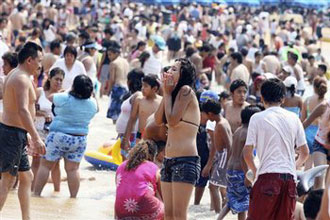
|  |  |  News Around the Republic of Mexico | May 2009 News Around the Republic of Mexico | May 2009  
Mexicans See Swine Flu as Mexico City's Problem
 Mark Walsh - Associated Press Mark Walsh - Associated Press
go to original


| | Tourists, mostly from Mexico City, pack the Caletilla beach in Acapulco, Mexico Friday May, 1, 2009. Scared with swine flu contagion, the Mayor of this resort city is telling tourists from Mexico City to go home. (AP/Javier Verdin) |  |
Monterrey, Mexico — Mexico's president credits a nationwide business shutdown and incessant health advice with helping contain the swine flu. But even with cases confirmed in 26 of the country's 32 states, most Mexicans see it as Mexico City's problem, and have largely ignored the restrictions.

From the industrial city of Monterrey to the bayside resort of Acapulco, many citizens refused to stay indoors or avoid crowds during the forced business holiday. They went shopping. They went to the beach. And they didn't wear protective gear.

"It's different here than in Mexico City," Manolo Valdes said in Monterrey. "People believe the situation is a bit exaggerated."

The engineering company he works for distributed surgical masks to 600 employees last week, with limited effect.

"The first few days a lot of people used them, but then people started taking them off or putting them on their heads because they're uncomfortable," Valdes said.

When the federal government ordered all nonessential businesses to close for five days beginning Friday, authorities in Monterrey had to drag people from bars and discos.

That was in sharp contrast to Mexico City, where mask-wearing residents gave each other a wide berth, taco stands were shuttered and many parents forbid their children from roaming outside. Still, more people were out on the capital's streets and some shops opened Monday after officials announced most of the restrictions would end this week.

Part of the problem: Most of Mexico's 27 swine flu deaths occurred in the capital and surrounding area, so many Mexicans elsewhere have decided they're safe.

That's a false sense of security about the flu's prevalence, said Marc-Alain Widdowson, an epidemiologist with the U.S. Centers for Disease Control and Prevention on assignment in Mexico. "It's clear that it's just about everywhere in Mexico."

Federal officials visited 2,507 businesses nationwide over the weekend to ensure they were complying with the health restrictions. They found that nearly half of them weren't, the Labor Department said.

In Monterrey, a northern city a 10-hour drive from Mexico City, restaurants, bars and shopping malls were closed Monday. But few people donned masks. The city's taco stands were jammed as always. Couples kissed in city parks, people gathered at barbecues and children flocked to ice cream parlors.

Jorge de la Fuente spent his weekend like many Monterrey residents do: shopping in Texas.

"We were more afraid that they were not going to let us cross the border," de la Fuente said Monday after returning from a weekend with his family at the malls in Laredo.

He said U.S. border officers waved his car through without asking a single health question. And the malls, frequented by Mexicans, were as packed as ever.

Restaurants and bars closed in the border city of Ciudad Juarez, so people made a beeline for El Paso, Texas. Many were more preoccupied with the long lines at the border crossing than swine flu.

"I don't think anything is going to happen here," said Roberto Nunez, who had been sitting in his car for 90 minutes waiting to cross. "According to the news, there's not one case (in Juarez)."

On the Pacific coast, bars and restaurants stayed open in the resorts of Puerto Escondido and Huatulco, even though offenders faced fines of up to 17,262 pesos, about $1,250. There was no word that anyone was fined.

More businesses were closed in Acapulco, a main getaway for Mexico City's residents. But women without masks or gloves assembled chili-sprinkled mangos on sticks and hawked buckets of shrimp to beachgoers.

The expanses of sand were packed – with few surgical masks in sight. Some locals mocked Mexico City visitors for pairing bikinis with masks.

"Surgical masks? What for?" said Marcos Matias, dicing fruit at a beachside juice stand. "We're outside sunning ourselves, and this illness is only where it's cold.

"Here at the beach, no one dies."

Associated Press writers Marina Montemayor in Ciudad Juarez, Ixtli Martinez in Oaxaca, Sergio Flores in Acapulco and Julie Watson in Mexico City contributed to this report. |

 |
|  |



